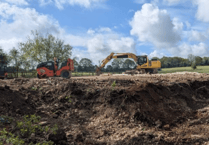A SENIOR Conservative member of East Hampshire District Council has spoken out against the possibility of 1,200 homes being built at Chawton Park Farm.
Cllr Diana Tennyson cited many environmental reasons why the site should not be in the council’s new Local Plan.
She said: “Chawton Park Farm is no longer the ‘preferred’ site – the word was dropped by the council on September 23. However, as a member for Chawton, Four Marks and Medstead, I felt unable to vote for the draft Local Plan because Chawton Park Farm is still under consideration.”
Cllr Tennyson – who describes herself as a naturalist, writer and conservationist, and also co-ordinates the council’s tree wardens – added: “I oppose development on farmland, because in my view it is important to retain grazing land and agricultural land as droughts and flooding are predicted because of climate change.
“Hydrology and geology are also important factors, as flooding could also reoccur in Chawton and Lower Farringdon despite culverts and ditches being maintained along the A31 and A32. Rainfall dumps on Four Marks, the highest point at 644 feet above sea level, and during torrential downpours rainwater flows downhill to Chawton and the A31 can resemble a river.”
The importance to swifts of dung dropped by sheep grazing on Chawton Park Farm should not be overlooked, warned Cllr Tennyson.
She said: “In May, swallows, house martins and swifts migrate to the UK to nest and raise their young, and are dependent on insects to feed their chicks. The sheep dung at Chawton Park Farm attracts insects, and this is important for all migratory bird species – but particularly for swifts.”
A fall in the proportion of old houses with nooks and crevices to provide nesting space has seen a drop in the number of swifts in the UK, and Cllr Tennyson said the loss of dung would exacerbate the problem.
She added: “Swifts are also at risk if development at Chawton Park Farm is approved.
“This is a very important area for foraging birds, and once the sheep and their dung disappear to be replaced by bricks and mortar, there will be very few insects for these birds to feed their chicks.
“Once the sheep disappear, sadly numbers of swifts and other migratory birds will also continue to decline.”




